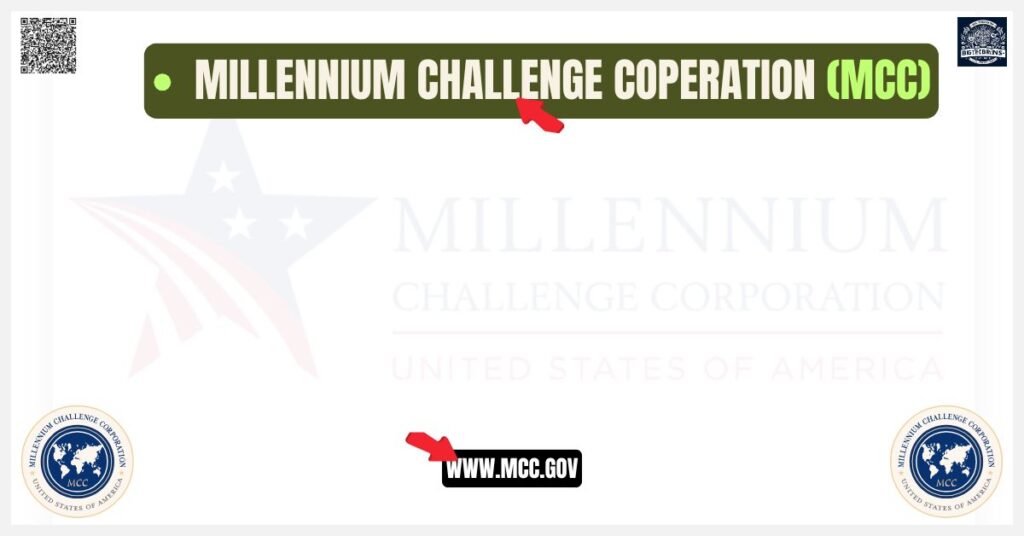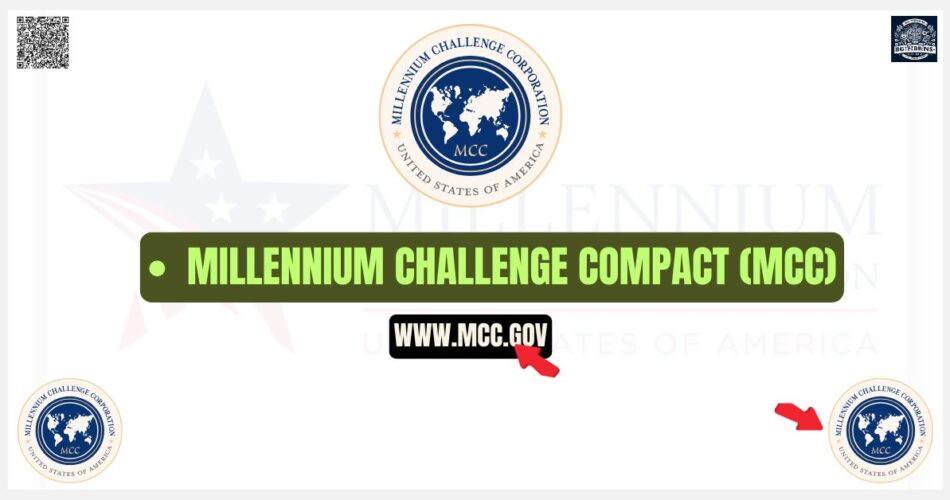Millennium Challenge Compact (MCC)
The Millennium Challenge Compact (MCC) is a U.S. foreign aid program designed to reduce poverty through economic growth. It’s administered by the Millennium Challenge Corporation, an independent U.S. government agency. Countries that qualify receive large-scale grants—called “compacts”—to fund transformative projects in sectors like energy, agriculture, education, and infrastructure.
Millennium Challenge Corporation (MCC)

The Millennium Challenge Corporation (MCC) is a U.S. government foreign aid agency officially established in 2004 under the Millennium Challenge Act of 2003 to carry out the provisions of the 2003 Act.
The Act laid out the legal framework, purpose, and operational principles for the new foreign aid program. It defined things like eligibility criteria, the structure of the corporation, and the types of assistance it would provide.
MCC Eligibility Summary
The Millennium Challenge Compact (MCC) eligibility is a rigorous, data-driven process designed to select countries committed to good governance and economic growth. The selection is based on a “Country Scorecard” with 20 independent indicators across three categories:
- Ruling Justly: Measures a country’s commitment to civil liberties, rule of law, and a key “hard hurdle” indicator for control of corruption.
- Encouraging Economic Freedom: Assesses economic policies such as inflation, fiscal policy, and trade openness.
- Investing in People: Evaluates public spending on health, education, and other human development factors.
- Have No Legal Prohibitions: Countries in debt default to the U.S. or international institutions are barred unless they have a restructuring agreement in place
To pass, a country must meet strict thresholds, including passing at least half of the indicators, with mandatory passes on “Control of Corruption” and a “Democratic Rights” indicator (Civil Liberties or Political Rights). The MCC Board also considers a country’s potential to reduce poverty and the availability of funds. Countries that show a commitment to reform but don’t yet qualify for a full compact may be eligible for a smaller-scale “Threshold Program.”
Ghana’s MCC Partnership History
Ghana’s First MCC Compact (2006 – 2012):
- Amount: $547 million
- Period: The compact was signed on August 1, 2006, and was officially in force from February 16, 2007, to February 16, 2012.
- Focus: focused on agriculture, transportation, and rural development.
Ghana’s Second MCC Compact (2016 – 2021):
- Amount: $498.2 million
- Period: The compact was signed on August 5, 2014, but officially entered into force on September 6, 2016. The five-year program was formally completed on June 6, 2022, which included a nine-month extension due to COVID-19-related delays.
- Focus: Energy sector reform, especially improving the performance of the Electricity Company of Ghana (ECG), expanding access to power, and attracting private investment
Why Ghana is Ineligible for the 2026 Fiscal Year
Ghana has been deemed ineligible for any new MCC compacts for the 2026 fiscal year due to its ongoing debt default.
This stems from a U.S. legal restriction under Section 7012 of the Fiscal Year 2025 State, Foreign Operations, and Related Programs Appropriations Act (SFOAA), which prohibits aid to countries in debt default to the U.S. or international financial institutions without a restructuring agreement in place. Ghana’s ongoing debt challenges, including a default on external debt in late 2022 and protracted negotiations for restructuring under the G20 Common Framework, have triggered this ineligibility. While Ghana meets the income and candidate country thresholds, it is among 18 nations barred due to such prohibitions, pending resolution of its debt issues. This does not directly affect the ongoing implementation of Ghana’s existing 2019 compact, which is set to conclude in late 2025, but it blocks access to future funding rounds.
Conclusion
While Ghana still meets income and policy criteria, this legal barrier blocks access to future MCC funding until its debt situation is resolved.
Frequently Asked Questions (FAQs)
1. What is the Millennium Challenge Corporation (MCC)?
- The MCC is a U.S. government foreign aid agency established in 2004 to reduce poverty through economic growth. It provides large-scale grants—called compacts—to countries that meet strict governance and economic criteria.
2. What does MCC funding support?
- MCC compacts fund transformative projects in sectors like energy, agriculture, education, and infrastructure. The goal is to promote sustainable development and economic reform.
3. How does a country qualify for MCC aid?
- Income level (low or lower-middle income)
- Performance on a 20-indicator scorecard (including control of corruption and democratic rights)
- No legal prohibitions, such as debt default without restructuring
4. What MCC compacts has Ghana received?
- First Compact (2006–2012): $547 million for agriculture, transportation, and rural development
- Second Compact (2016–2021): $498.2 million for energy sector reform
5. Why is Ghana ineligible for MCC aid in FY2026?
- Ghana defaulted on external debt in late 2022 and has not finalized a restructuring agreement. Under U.S. law (Section 7012 of the FY2025 Appropriations Act), this bars Ghana from receiving new MCC funding in FY2026.
6. Does this affect Ghana’s current MCC compact?
- No. The ineligibility applies to future funding. Ghana’s second compact, which was extended due to COVID-19, is still being implemented and set to conclude in late 2025.
7. Can Ghana regain MCC eligibility?
- Yes—if Ghana resolves its debt issues and meets MCC’s legal and policy criteria, it may be reconsidered for future compacts.

